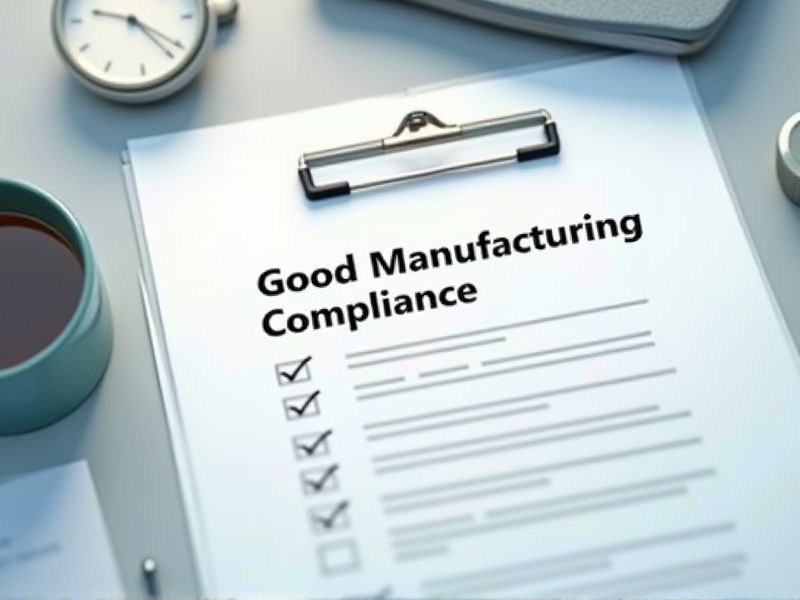
A Good Manufacturing Practice (GMP) Compliance Officer plays a pivotal role in ensuring that production processes meet necessary quality and regulatory standards. Their responsibilities demand a deep understanding of complex compliance requirements, which often necessitates specialized training. Certifications equip these professionals with the essential knowledge and skills to effectively monitor and enforce GMP guidelines. Here are some important certifications you may need as a Good Manufacturing Practice Compliance Officer.
Certified Quality Auditor (CQA)
Certified Quality Auditors (CQAs) possess in-depth knowledge of quality control principles, essential for identifying compliance gaps in manufacturing processes. Their certification ensures they understand regulatory standards, including GMP, crucial for maintaining product safety and efficacy. Without a CQA, companies might face increased risks of regulatory penalties due to overlooked compliance issues. Employing a CQA enhances a GMP compliance officer's ability to implement and sustain effective quality management systems.
Certified Manager of Quality/Organizational Excellence (CMQ/OE)
A Certified Manager of Quality/Organizational Excellence (CMQ/OE) enhances a Good Manufacturing Practice Compliance Officer's ability to implement and maintain high-quality standards within pharmaceutical or manufacturing settings. Possessing CMQ/OE certification equips the officer with advanced skills in quality management systems, which are crucial for adhering to strict regulatory requirements. The knowledge gained through the certification helps streamline processes, reduce waste, and ensure product safety and efficacy. Companies benefit from employing CMQ/OE-certified professionals as they are often better prepared to handle audits and prevent compliance issues.
Good Manufacturing Practice (GMP) Certification
The Good Manufacturing Practice (GMP) Certification ensures that a Compliance Officer has a comprehensive understanding of regulatory standards crucial for maintaining product quality and safety. It validates their expertise in identifying non-compliance issues that could lead to contamination or defects during production processes. Certification typically inspires trust among stakeholders and mitigates risks associated with legal penalties or product recalls. Possessing GMP Certification often enhances efficiency in regulatory audits and inspections, thereby reducing operational costs and fostering a culture of continuous improvement within manufacturing facilities.
ISO 9001 Lead Auditor Certification
ISO 9001 Lead Auditor Certification equips a Good Manufacturing Practice Compliance Officer with the skills necessary to conduct thorough quality management audits, ensuring processes align with international standards. Certification enhances the officer's ability to identify non-compliance issues within the manufacturing environment, thus mitigating risks associated with product recalls or safety violations. Understanding audit principles and techniques increases the officer's proficiency in implementing corrective and preventive actions effectively. Ultimately, having this certification reflects a commitment to maintaining high-quality standards, which strengthens consumer confidence and supports regulatory compliance.
Certified Pharmaceutical GMP Professional (CPGP)
Certified Pharmaceutical GMP Professionals (CPGPs) bring specialized knowledge in Good Manufacturing Practices (GMP), which enhances the compliance officer's ability to ensure pharmaceutical quality. Their expertise in identifying and mitigating risks associated with drug production reduces the likelihood of regulatory infractions. With a comprehensive understanding of industry standards, CPGPs significantly improve the efficiency of compliance processes. Their certification, recognized by regulatory bodies, lends credibility and trustworthiness to compliance operations within pharmaceutical settings.
Certified Regulatory Compliance Manager (CRCM)
A Certified Regulatory Compliance Manager (CRCM) brings specialized knowledge in navigating complex regulatory frameworks, crucial for ensuring Good Manufacturing Practice (GMP) adherence. Their expertise aids in the development and implementation of compliance programs, which helps mitigate the risk of regulatory violations in manufacturing processes. CRCMs play a critical role in training staff on compliance best practices, ensuring operations align with both industry standards and legal requirements. The presence of a CRCM can facilitate smoother regulatory audits, reducing the potential for costly penalties and improving the company's reputation for safety and reliability.
Certified Quality Engineer (CQE)
The role of a Certified Quality Engineer (CQE) ensures adherence to stringent quality standards, which aligns directly with the objectives of a Good Manufacturing Practice (GMP) Compliance Officer. A CQE possesses the expertise to analyze and improve processes, addressing inefficiencies that could lead to non-compliance in manufacturing operations. Proficiency in statistical tools and quality control methods equips CQEs to identify and mitigate risks, supporting GMP officers in maintaining consistent product quality. Employers benefit as employing a CQE reduces the likelihood of regulatory issues, safeguarding both product integrity and business reputation.
Lean Six Sigma Green Belt Certification
Lean Six Sigma Green Belt Certification equips compliance officers with skills to streamline manufacturing processes, reducing waste and improving efficiency. Improved process efficiency ensures that manufacturing practices consistently meet GMP standards, critical for regulatory compliance. These skills also enable the identification and mitigation of risks associated with non-compliance in manufacturing. Enhanced problem-solving capabilities gained from the certification lead to more effective corrective and preventative measures in GMP adherence.
HACCP Certification
HACCP Certification ensures that a Good Manufacturing Practice Compliance Officer is knowledgeable about identifying and managing food safety hazards. A certified officer is better equipped to develop and implement preventive measures, reducing risks of contamination. Compliance with HACCP principles supports meeting regulatory requirements, which is essential for maintaining operational licenses. Certified officers also foster consumer confidence by ensuring products consistently meet safety and quality standards.
Certified Biomedical Auditor (CBA)
Certified Biomedical Auditors possess a deep understanding of quality management principles, which is essential for ensuring that a Good Manufacturing Practice (GMP) Compliance Officer can effectively oversee production processes. Their expertise in identifying non-conformities directly impacts the ability to maintain product quality and patient safety. The CBA's ability to evaluate audit results ensures that GMP practices adhere to regulatory requirements. Continuous improvement initiatives are effectively driven by CBAs, leading to enhanced compliance and operational efficiency.
Summary
As a compliance officer attaining certifications, you enhance your credibility and expertise in the field of good manufacturing practices. This can lead to increased trust from employers and colleagues, potentially unlocking career advancement opportunities and higher responsibilities. Certifications also equip you with up-to-date knowledge, allowing for more effective monitoring and implementation of compliance standards. The organization benefits with improved product quality, reduced risk of regulatory issues, and a reinforced reputation in the industry.
